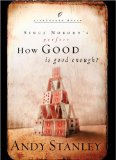How Good is Good Enough? By Andy Stanley. Sisters, OR: Multnomah Publishers, 2003. 92 pp. Cloth. $9.99.
Andy Stanley’s small evangelistic book takes readers on an intellectual quest. Instead of telling them what to believe, with proof texts, he leads them to draw the logical conclusion that no one enters heaven by being good—only by being forgiven.
In his 92-page book, which can be read in an hour or two, Stanley refers to major religions and debunks the universally held belief that good people make it. By means of logic, anecdote, sarcasm, and even shock statements, he leads readers to consider the fallacies of trusting in their own sense of right and wrong, or even in God’s supposed standard, the Ten Commandments. He stops the reader in his tracks when he says that the most surprising obstacle to the good-people-go view is that Jesus did not believe it! Jesus drove religious leaders crazy by telling people their sins were forgiven. He reinterpreted Jewish laws and told the Pharisees they weren’t good enough. Then he assured the outcasts of society that they had a place in heaven. Go figure!
Stanley does his version of the “Liar, Lunatic, or Lord” scenario by proving that Jesus either deceived us, He was deceived, His disciples made it up after He left, or He was truly the once-for-all sacrifice for sin.
Finally, Stanley confronts the issue of God being fair. After showing readers their guilt before God, he convinces them they do not want fairness, which would give them what they deserve. God goes beyond fair to give us grace and mercy rather than justice. This is possible only because Jesus got what He didn’t deserve.
The final destination for Stanley ’s readers will lead them to conclude that the “whosoever” of John 3:16 includes everyone who is willing. He says, “Believing in him is the only requirement. Believing means placing one’s trust in the fact that Jesus is who he claimed to be and that his death accomplished what he claimed it accomplished…what matters is that you are no longer trusting in what you have done, or will do, to get you to heaven.”
The book is a non-threatening and non-ethnocentric evangelistic tool, probably suited to older teens and up. It targets academically minded people, although numerous relevant illustrations simplify it and keep the reader’s attention. Best of all, Stanley adds no works to faith. He includes a “sample prayer” as a way of expressing gratitude to God, but states that “saying a prayer won’t make you a Christian. Placing your faith in Christ as your savior makes you a Christian.”
Marcia Hornok
Salt Lake City, UT

